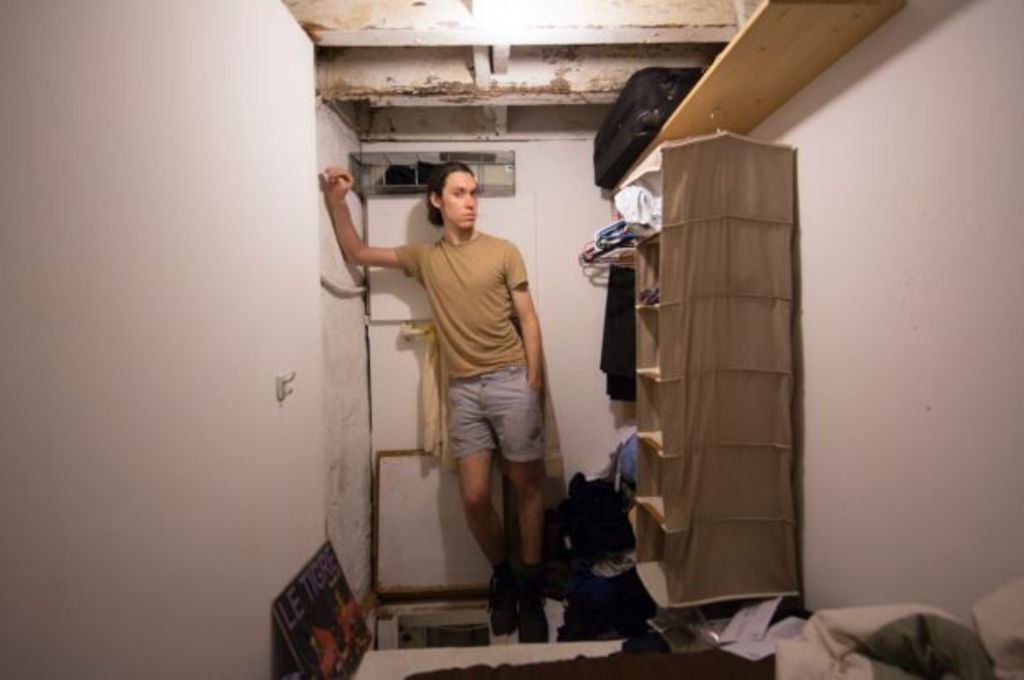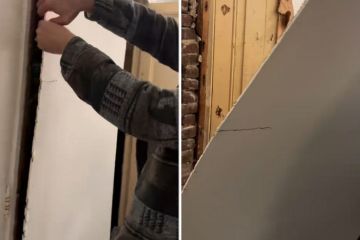The man renting one of the world's smallest properties: a crawl space in New York City

The first thing that people want to know about Jack Leahy’s home, a 3.7-square-metre cubbyhole tucked into the ceiling of a performance space a few blocks from the waterfront in Brooklyn, is whether it’s legal. The second question is how much he pays.
He doesn’t know the answer to the first. As for his rent? Tell a New Yorker you pay $US450 ($600) a month, and he or she becomes very, very jealous.
“But they don’t have any idea,” Leahy said. “It’s like ‘The Phantom of the Opera’ – how much did that guy pay?”
On a recent evening, Leahy, a 25-year-old musician who moved to New York from Austin, Texas, late in September 2015, pulled up in front of his home address on a skateboard, a Narragansett tall boy in one hand. The sun was setting over the East River, so he suggested a stop in his “living room” – a rock outcropping on the banks – before climbing the ladder to his quarters. Yes, a ladder.
While real estate agents and promoters often describe local hot spots as extensions of one’s living space, using the amenities of the greater Williamsburg neighbourhood is a necessity for Leahy. His windowless den measures roughly 2.7 metres long and 1.37 metres wide. You can stand at the entry, but once inside you mostly stoop – it’s only about 1.5 metres high. A twin-size futon mattress takes up most of the space.
Leahy, who works at Best Pizza in Williamsburg, spends a lot of time watching soccer at a nearby bar, or in his $220-a-month music studio in East Williamsburg, which he says is about the same size as his crawl space, except that the ceiling is of normal height. It also lacks a window, but he can at least unfurl his 180cm frame – a nice change from stooping. He also likes to browse the record shops in Greenpoint, which is also the home of Captured Tracks, the independent record label that he hopes will sign him someday.
“That label was the reason I moved to New York,” said Leahy, a pop/minimalist composer who goes by the name Socrates.
Leahy is proficient on keyboards, synthesisers, drum machines and sequencers.
“I mix and record everything on an old reel-to-reel tape machine,” he said.
Leahy must keep quiet during rehearsals in the performance space below him, which can be any time between 9 a.m. and 10 p.m., seven days a week. Fortunately, the Wi-Fi is great, so he can always watch soccer matches if he doesn’t feel like reading. He’s also required to maintain a ghostly profile in the kitchen and office in the back of the building, which is where the bathroom is. It has a shower, in case you were wondering.
Despite the restrictions, Leahy faced fierce competition and had to woo his way into his cubbyhole. His ex-girlfriend, an artist, told him about the unorthodox residence and referred him to the landlords, who were swayed, he said, by his “very long, thoughtful, funny, charming email” that described, in detail, his minimal grocery storage needs.
He took the space sight unseen and insists that he had no misgivings when he arrived.
“I think I was happy to be in New York and that I actually had a place,” Leahy said. “It was just kind of comical. It is comical. Whenever I show people where I live, they always laugh.”
He awakens many mornings to the sounds of experimental theatre: strange clanging, performers speaking in gibberish, chants. The space is ovenlike in the summer, cozy in winter.
And although he doesn’t see much of them, he likes his quasi-roommates: seven other artists and creative types who live in the warren of more traditional rooms at the back of the building.
“Though I’m always jealous when I see them sitting on chairs in their rooms,” he admits.
Occasionally, there are parties in the building – and not just any parties, really good ones – “the kind of thing you’d imagine happening in Bushwick or Ridgewood,” he says.
There are some serious drawbacks, of course. The door behind his bed opens onto a sheer drop into the performance space, which gave him a scare a few months back when he leaned against it and felt it moving. Nor does he recommend nights of heavy drinking or hosting visitors, especially if romance is in the cards.
“Things get intimate really fast. You basically can’t do anything but lie down,” Leahy warned. “At the same time, too much moving around up here doesn’t feel safe.”
Nonetheless, he recently decided to stay for another year. Romantic rendezvous chez Leahy are not a concern at the moment. He got back together with his girlfriend, the one who told him about the crawl space, and she lives in a nearby studio – a proper one, with windows and more than enough clearance to walk upright.
And while some people might find even a good-size studio cramped for two, Leahy is not one of them.
“Are you kidding me?” he asked. “It feels like a great hall.”
We recommend
States
Capital Cities
Capital Cities - Rentals
Popular Areas
Allhomes
More
- © 2025, CoStar Group Inc.







